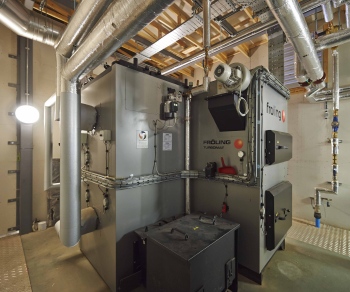How biomass heating scores on all fronts
Peter Lester of Econergy looks at the environmental, financial and practical arguments in favour of biomass and prefabricated biomass energy centres.
Whether you are replacing an old heating system or seeking out a heating solution for a new build project, pre-fabricated biomass energy centres offer a reliable, low-cost and low-carbon energy solution.
Biomass boiler systems are highly suitable for schools, commercial properties and rural estates — as well as larger-scale district-heating schemes and affordable housing projects, where keeping down the cost of fuel and reducing carbon emissions has become a top priority.
Biomass boilers use wood chip or wood pellets — a renewable source of fuel that provides a low-cost green alternative to fossil fuels for both retrofit and new-build projects.
Biomass heating has become an increasingly popular choice for building projects in recent years as it qualifies under the Government’s renewable heat incentive (RHI) — a scheme introduced in 2011 to encourage organisations to work towards a low-carbon future. It was initially only applicable to industry, businesses and public sector organisations but, since April this year, it has been opened up to the domestic market — primarily aimed at homes off the gas grid.
The scheme means that although biomass systems require a higher capital outlay than conventional heating systems the cost can be offset over time with payments for the low-carbon heat that they generate.
Added to that, biomass boilers are efficient and reliable, and the cost of the wood chip or wood pellets can be more stable and cheaper than fossil fuel.
There are a number of practical considerations that need to factored into planning stages when opting for a biomass system. The boiler will take up a larger area than the gas or oil equivalent and requires extra space for fuel storage. There also needs to be sufficient access for fuel delivery, which is usually lorry tipped or blown directly into a fuel store.
Prefabricated biomass energy centres provide an ideal solution as they are purpose-built, stand-alone structures that house a biomass boiler and also include the fuel store, controls, plumbing and electrics, chimney, lighting, sockets, ventilation and access doors.
A key advantage of choosing a biomass energy centre is the hassle-free installation process. Its off-site construction allows for fast and simple site installations. Prefabricated elements can be broken down for transport and rapidly assembled in position on site. The system simply requires lifting by crane onto a concrete slab, or a mini-piles solution, and connecting to the services on site.
Available in a variety of modular designs and boiler sizes, these units can be tailored to meet most requirements and offer a green solution on existing sites with restricted plant room space, or a clean and modern stand-alone energy centre for new developments.

Opting for a biomass energy centre means having a system that, from point of installation, will efficiently and consistently match the levels of heat provided by gas or oil fuelled systems without the disruption and expense of major alterations such as refitting pipe work and radiators within a building. The entire plant room can be positioned away from the main buildings, which can be an advantage from both a practical and aesthetic perspective.
Because all the complex engineering, welding and building work is completed before the system arrives for fitting, on-site disruption is significantly minimised and there are fewer contractor co-ordination issues. With fewer people needed to fit the systems, it lessens the on-site health and safety risks and reduces site costs such as staff facilities.
A recent project where prefabricated biomass energy centres have been installed is for Stockport Housing to provide heating to over a thousand homes at four social-housing sites.
Econergy provided new Ecoblox energy centres at three sites and retrofitted an existing boiler room at a fourth site. Four Froling Turbomat 500 kW boilers and a Froling Turbomat 320 kW boiler were fitted along with 5 MW of gas-fired condensing boilers to provide standby capacity and cover peak loads. At all of the sites, wood chips are received using Econergy’s fast auger (loading) systems which can receive ground level deliveries from a variety of standard tipping vehicles with minimum noise and dust.
The installation is expected to save a massive 300 000 t of CO2 emissions over the next 20 years. Following completion of the installation, Stockport Housing was named winner of the Renewable Energy Association Pioneer Award in recognition of its pioneering use of renewable technology to address the issue of fuel poverty for its tenants.
At Stockport Housing’s Lancashire Hill site, the old gas boilers were replaced with a 999 kW biomass solution. This saw a 75% reduction of CO2 emissions from over 1800 t per year with the old gas boilers to just over 400 t per year with the biomass.
A recent increase in the RHI tariff paid for use of larger biomass boilers exceeding 1 MW will provide further incentive to use these systems in larger projects. The implications can already be seen with plans underway for many larger-scale projects throughout the UK.
Peter Lester is product manager with Econergy.







